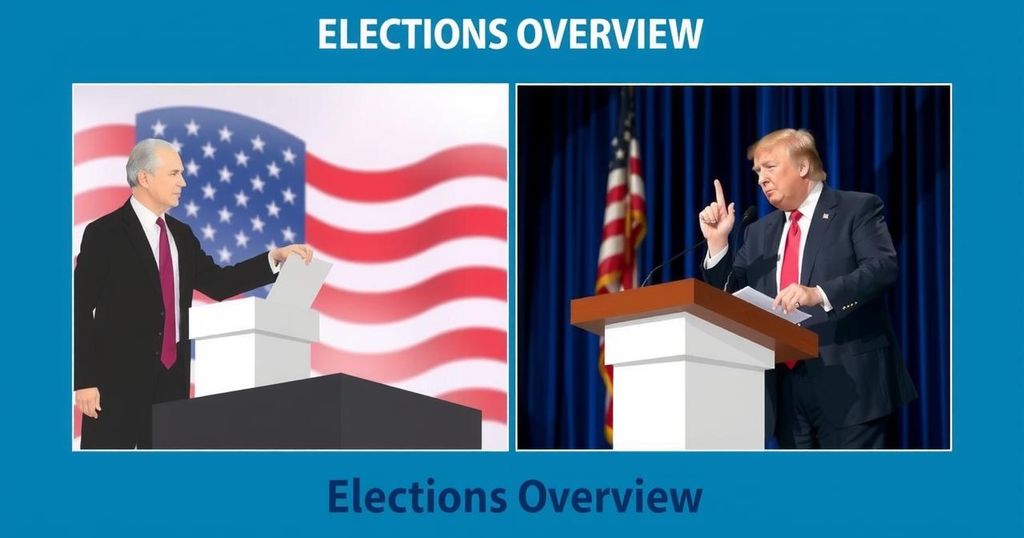2024: A Landmark Year for Global Elections and Democratic Engagement
The year 2024 marked a historic milestone in global democracy, with nearly 3 billion voters participating in elections across 73 countries, indicating a significant level of engagement. However, major challenges persisted, such as disinformation, eroding trust in institutions, and the underrepresentation of women and youth in politics. The elections underscored the need for reforms that enhance democratic processes while addressing systemic issues affecting representation and governance.
The year 2024 established a historic benchmark in democratic engagement, with approximately 3 billion individuals participating in elections across 73 nations, marking it as the largest electoral year recorded. This unprecedented turnout at various governmental levels not only impacted the political landscapes of these countries but also highlighted the inclusive potential of democratic systems as many first-time voters emerged. Nonetheless, the year signified significant challenges for democracy, as a substantial majority of citizens reported feelings of disconnection from political processes, with two-thirds expressing that their voices remained unheard.
The erosion of trust in institutions was increasingly evident, fueled by rampant disinformation, escalating political divisions, and the manipulation of state resources by incumbents attempting to retain influence. The proliferation of social media and artificial intelligence further complicated these issues, contributing to misinformation and raising genuine concerns about the integrity of electoral processes through technologies, such as deepfakes.
Marked as a ‘super election year,’ 2024 witnessed remarkable shifts in political power as voters frequently removed incumbents judged to be disconnected from public sentiment. In countries like France and Germany, the traction of far-right movements was notable, albeit mitigated by centrist coalitions adept at obstructing these groups from gaining power. Irregularities, including vote-buying and voter suppression measures, severely undermined trust in electoral integrity.
Amid these adversities, signs of democratic resilience were evident, particularly in Africa, where a new generation of leaders emerged in nations such as Chad, Mozambique, and Senegal, symbolizing a progressive shift towards inclusive governance. Collaborative voter efforts across various ideological divides underscored the collective desire to uphold democratic values. However, challenges persisted, especially regarding gender and youth representation.
Despite notable advancements in women’s political participation in countries like Mongolia, which saw a seven-percentage-point rise in parliamentary representation due to gender quotas, setbacks occurred in other regions, most prominently in Bhutan and Belarus. Youth representation remains a pressing concern, as most political offices continue to be held by older leaders, with the average age of executives declining marginally in 2024. Amid rising economic challenges, voter sentiment increasingly favored anti-incumbent positions, eventually reflecting a substantial push for systemic reform centered on inclusivity and representation.
The 2024 elections reveal a dual narrative of progress and vulnerability within modern democracies, emphasizing the critical balance between striving for reform while addressing the pressing threats to democratic norms posed by disinformation, polarization, and systemic inequalities in representation.
The 2024 elections were observed to be a significant moment in global democracy, showcasing the simultaneous challenges and advancements faced by democratic systems worldwide. The record turnout of nearly 3 billion voters highlighted the widespread engagement and importance of inclusive governance. However, prevailing concerns regarding electoral integrity, misinformation, and disparities in representation reflect ongoing threats to democratic stability. Understanding these dynamics is essential for comprehending the evolving landscape of international political participation and the potential paths for reform and resilience.
In conclusion, the 2024 elections highlighted both the strong engagement of the electorate and the frailties within democratic systems. The considerable participation rate, indicative of a vibrant democratic process, stands juxtaposed against the substantial challenges of disinformation and a perceived disconnect between the electorate and their representatives. Moving forward, opportunities exist to revitalize democratic engagement through reform and increased inclusivity, ensuring that the democratic ideals of both representation and accountability are upheld.
Original Source: anfrel.org




Post Comment